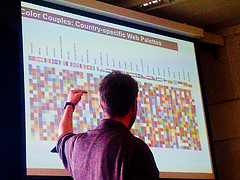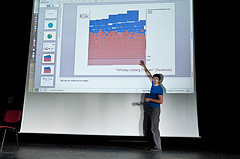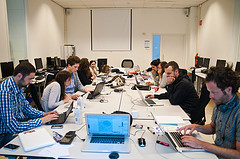Post-API Research? On the contemporary study of social media data
Digital Methods Winter School and Data Sprint 2020




Digital Methods Winter School and Data Sprint 2020
13-17 January 2020
https://wiki.digitalmethods.net/Dmi/WinterSchool2020
Opening Day Location and Time:
Oudemanhuispoort 4-6 (Law Faculty Building, University of Amsterdam)
1012 CN Amsterdam
Room: D0.08.
9.15am Please be on time! Everyday location:
Digital Methods Initiative
University of Amsterdam
Turfdraagsterpad 9
1012 XT Amsterdam
Project write-ups
Please make a project page wiki, and add your project write-up. Here is an example, https://wiki.digitalmethods.net/Dmi/WinterSchool2019Normiefication. You can place multiple sub-projects into one wiki report, or you can create a set of subprojects, e.g., https://wiki.digitalmethods.net/Dmi/WinterSchool2019FakingNews. Practically speaking, to create a project page, make a wiki page such as https://wiki.digitalmethods.net/Dmi/WinterSchool2020QAnon by typing such a URL (note the syntax), and then creating the page. If you do not have a DMI wiki account, create one. When you try to edit a page, you'll be asked to log in, at which point you can create an account. Please link your wiki (by editing this page) to the respective project title below.- Haters gonna hate: Dissecting hate speech on social media
- Amazon Tracking Exposed
- Disinformation in anti-EU Facebook groups
- YouTube Tracking Exposed: Investigating polarization
- Apps and Their Practices
- Beautification Apps: A Cross-Country Analysis Regarding Face Modification Features
- Gender in app stores + Gender bias in Health & Fitness Apps
- Public/Private Privacy Distinction in Iranian and American Google Play
- Who knows your sleeping score? + The Fitbit app ecosystem
- The digital portray of a city
- Who is /ourguy/?: Studying political Internet subcultures through their identification with public figures
- #youmustbekiddin’ (#datmeenjeniet)
- Conspiracy Creation Techniques
- Analysing Neo-Nationalism movements
- Newswork on Wikipedia
Keynotes - slides & videos
Anat Ben-David, Counter-archiving Facebook, http://bit.ly/dmi20-ws-dranat-slides Richard Rogers, Deplatforming, http://bit.ly/telegramstudy Video: http://bit.ly/dmi20-ws-rogerskeynote. Richard Rogers, Sabine Niederer, Maarten Groen, Guillen Torres, Stijn Peeters, Marc Tuters, Sal Hagen, Emilija Jokubauskaite, Gabriele Colombo, Carlo De Gaetano, The Politics of Social Media Manipulation, http://bit.ly/politics-socmedFinal Presentations
Slides: http://tiny.cc/dmi20-ws-finalslides| Project | Presentation time |
| Haters gonna hate: Dissecting hate speech on social media | 10' |
|---|---|
| Amazon Tracking Exposed | 15' 15.25 |
| Disinformation in anti-EU Facebook groups | 10' 15.35 |
| YouTube Tracking Exposed | 10' 15.45 |
| Apps and Their Practices | 15' 16.00 |
| BREAK | |
| Who is /ourguy/?: Studying political Internet subcultures through their identification with public figures | 20' 16.25 |
| #youmustbekiddin’ (#datmeenjeniet) |
10' 16.45 |
| Conspiracy Creation Techniques | 12' 16.47 |
| Analysing Neo-Nationalism movements | 10' 17.07 |
| Newswork on Wikipedia | 10' 17.17 |
Important Links
- Call for participation and general information: http://bit.ly/dmi20-ws-call
- Welcome Package: http://bit.ly/dmi20-ws-welcomepack. Contents: Welcome note, day-to-day schedule, maps of venue locations, coffee, and lunch places, preparations, and further instructions.
- The welcome package folder: http://bit.ly/dmi20-ws-wpfolder. Contents: the reader, face book, and other linked documents.
- Map of Coffee and Lunch places: http://bit.ly/dmi20-ws-lunch-coffee
- Project descriptions to be pitched on the opening day: https://bit.ly/dmi20-ws-projects
- The reader: http://bit.ly/dmi20-ws-reader. And the reader folder: http://bit.ly/dmi20-ws-reader-folder
- Tutorials: http://bit.ly/dmi20-ws-tutorial-schedule
- Form to sign up for tutorials: http://bit.ly/dmi20-ws-tutorials-form
- Map of principal locations: http://bit.ly/dmi20-ws-venues
- G-doc template for project reports: http://bit.ly/dmi20-ws-gdoc-template. And Wiki template: http://bit.ly/dmi20-ws-template-wiki
- Collaborative note taking for Keynotes: http://bit.ly/dmi20-ws-notes
- The Face Book of international participants: http://bit.ly/2qx3Lo4
- Official hashtag: #dmi20
- Slack Channel: https://dmi20-ws.slack.com/ Link to join: http://bit.ly/dmi20-ws-slackinvite.
- Presentation slides: http://bit.ly/dm20-ws-slides.
Rooms for Projects
(Everyone was assigned to their first choice of project)| Project | Room |
| Who is /ourguy/?: Studying political Internet subcultures through their identification with public figures | BG1 0.16 |
|---|---|
| Amazon Tracking Exposed | Universiteitsbibliotheek C1.13 (Belle van Zuylenzaal) |
| Disinformation in anti-EU Facebook groups | BG2 0.12 |
| YouTube Tracking Exposed | Universiteitsbibliotheek C1.08 (Vondelzaal) |
| Apps and Their Practices | BG1 0.04 |
| Haters gonna hate: Dissecting hate speech on social media | Universiteitsbibliotheek C0.01 (Potgieterzaal) |
| #youmustbekiddin’ (#datmeenjeniet) |
BG2 0.02 |
| Conspiracy Creation Techniques | BG1 0.12 |
| Newswork on Wikipedia | BG1 0.13 |
| Analysing Neo-Nationalism movements | BG1 0.13 |
| Socio-political dimensions of job automation [Cancelled] | [Cancelled] |
Digital Methods Winter School and Data Sprint
The Digital Methods Initiative (DMI), Amsterdam, is holding its annual Winter School on 'Post-API research?' On the contemporary study of social media data.' The format is that of a (social media and web) data sprint, with tutorials as well as hands-on work for telling stories with data. There is a programme of keynote speakers as well as a book launch of 'The Politics of Social Media Manipulation' (Amsterdam University Press, 2020). It is intended for advanced Master's students, PhD candidates and motivated scholars who would like to work on (and complete) a digital methods project in an intensive workshop setting. For a preview of what the event is like, you can view short video clips from previous editions of the School. From Big to Little Data?Recently Facebook officially ended its Pages API and has 'replaced' it with the Social Science One project which curates data sets for researchers. Studying engagement on Russian disinformation pages, or on those of the Alt Right, have become improbable because post engagement measures are no longer available. Instagram shut down its API years ago, so projects such as Selfie City no longer can be undertaken, unless one scrapes data. Twitter has disabled certain data fields such as tweet time zone, thereby making it unlikely to continue to map the Australian Twittersphere, to take just one example. There is an API graveyard, and those discontinued services were once the starting point of both social research as well as social media critique. There is a great deal of missing data as well, because the aforementioned Russian disinformation pages and many others have been removed, such as with a recent YouTube purge.
API Critique
What to do? There are at least five pathways for renewal that are emerging. There are the return of scraping data and the concomitant discussions around breaking terms of service; user data dumps and crowdsourced data donations; small data digital ethnography and what were once called 'virtual methods'; social media 'counter-archiving' practices; and API critique. The Winter School is dedicated to taking up questions concerning the remnants of social media data served by the API as well as alternatives. At the Winter School there are the usual social media tool tutorials (and the occasional tool requiem), but also invitations for thinking through and proposing how to work with social media data after the demise of the API.
Applications: Key Dates
The deadline for application is 19 November 2019. To apply please enter on the secure website a letter of motivation, your CV (including postal address), a headshot photo, 100-word bio as well as a copy of your passport (details page only). Alternatively you may send those materials along to winterschool [at] digitalmethods.net. Notifications of acceptance will be sent on 20 November. The full program and schedule of the Winter School are available by 19 December 2019.Tuition Fees, Accommodations & Completion Certificates
The fee for the Digital Methods Winter School 2020 is EUR 695, and upon completion all participants receive certificates (and 6 ECTS). To complete the Winter School successfully all participants must co-present the final presentation and co-author the final project report, evidenced by the presentation slides as well as the final report itself. Bank transfer information is sent along with the notification on 19 November 2019. Participants must pay the fee by 6 January 2020. Students at the University of Amsterdam do not pay fees. Participants from LERU as well as U21 universities receive a tuition waiver of EUR 500. Dutch universities in LERU and U21 unfortunately are unable to receive the tuition waiver. The Winter School is self-catered. The venue is in the center of Amsterdam with abundant coffee houses and lunch places. Participants are expected to find their own housing (short-stay sites are helpful), or we have available accommodations at the Student Hotel: The Student Hotel AmsterdamJan van Galenstraat 335
1061 AZ Amsterdam, The Netherlands
Tel: +31 20 760 4000
(Arrival: 12 January 2020; Departure: 18 January 2020)
https://www.thestudenthotel.com/amsterdam-west
reservations [at] thestudenthotel.com or tel. +31 20 760 7575. See full booking instructions including discount code.
If you would like to have accommodations at the Student Hotel, please write to the student hotel directly. To avoid disappointment, please write to them as early as possible. Ask the hotel for the 15% Digital Methods Winter School discount. The Winter School closes on Friday with a festive event, after the final presentations. Here is a guide to the Amsterdam new media scene. For further questions, please contact the local organizers, at winterschool [at] digitalmethods.net. Please bring your laptop computer, your European plug as well as the VGA adaptor for connecting to the projector.
About DMI
The Digital Methods Winter School is part of the Digital Methods Initiative (DMI), Amsterdam, dedicated to developing methods for Internet-related research and the study of the natively digital. The Digital Methods Initiative holds the annual Digital Methods Summer Schools (twelve to date), which are intensive and full-time undertakings in the Summertime. The next Summer School will take place from 29 June to 3 July 2020. There is a practical textbook, Doing Digital Methods (Sage, 2019). The Digital Methods book (MIT Press, 2015) provides the methodological outlook that frames and informs the work of the DMI. This is accompanied by a companion volume about mapping social and political issues with digital methods: Issue Mapping for an Ageing Europe (Amsterdam University Press, 2015), which is also freely available on the web as an open access monograph. Further information and resources about digital methods can be found at digitalmethods.net - including links to example projects, publications, tools, an introductory "founding narrative" about the Digital Methods Initiative as well as short bios of the affiliated researchers. The coordinators of the Digital Methods Initiative are Dr. Sabine Niederer (Amsterdam University of Applied Sciences) and Dr. Esther Weltevrede (New Media & Digital Culture, University of Amsterdam), and the director is Richard Rogers, Professor of New Media & Digital Culture, University of Amsterdam.About Digital Methods as a Concept
Digital methods is a term coined as a counterpoint to virtual methods, which typically digitize existing methods and port them onto the Web. Digital methods, contrariwise, seek to learn from the methods built into the dominant devices online, and repurpose them for social and cultural research. That is, the challenge is to study both the info-web as well as the social web with the tools that organize them. There is a general protocol to digital methods. At the outset stock is taken of the natively digital objects that are available (links, tags, threads, etc.) and how devices such as search engines make use of them. Can the device techniques be repurposed, for example by remixing the digital objects they take as inputs? Once findings are made with online data, where to ground them? Is the baseline still the offline, or are findings to be grounded in more online data? See R. Rogers (2009), The End of the Virtual: Digital Methods. Amsterdam: Amsterdam University Press.Social
We are using the #DMI20 hashtag as the backchannel for communication (to use a throwback term for Twitter usage). Some pictures from Winter School 2015. Here is the Facebook Group from one year, and from the last Summer School. Here are pictures from a variety of DMI Summer and Winter School flickr streams.EU Project
Two of the Winter School projects -- Analysing Neo-Nationalism movements and Newswork on Wikipedia -- are part of the EU Project, CLEOPATRA. The overall Winter School is part of the EU Project, ODYCCEUS.| I | Attachment | Action | Size | Date | Who |
Comment |
|---|---|---|---|---|---|---|
| |
UvAXTSHWinter2020_AMS01.pdf | manage | 548 K | 29 Sep 2019 - 15:48 | RichardRogers | Student Hotel DMI Winter School |
 Copyright © by the contributing authors. All material on this collaboration platform is the property of the contributing authors.
Copyright © by the contributing authors. All material on this collaboration platform is the property of the contributing authors. Ideas, requests, problems regarding Foswiki? Send feedback

